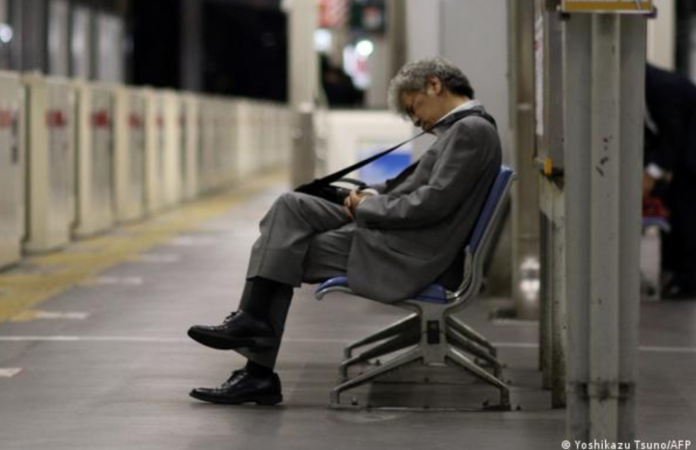The Japanese government has just unveiled its annual economic policy guidelines, which include new recommendations that companies permit their staff to opt to work four days a week instead of the typical five.
Japan’s famously hard-working salarymen — and, increasingly, salarywomen — are to be encouraged to reduce the amount of time they spend in the office environment as part of the government’s initiative to improve the nation’s work-life balance.
The recently unveiled annual economic policy guidelines include new recommendations that companies permit their staff to opt to work four days a week instead of the typical five.
The coronavirus pandemic has already brought huge changes to the way that Japanese corporations — many of which are still highly rigid and traditional — go about their business.
Political leaders now hope to convince management that flexible working hours, remote working, growing interconnectedness and a host of other developments can be beneficial if they remain in place even after the end of the health crisis.
Employment pluses
The government said in the outline of its campaign that, with a four-day working week, companies would be able to retain capable and experienced staff who might otherwise have to leave if they are trying to raise a family or take care of elderly relatives.
A four-day workweek would also encourage more people to gain additional educational qualifications or even take on side jobs in addition to their regular employment, according to the government.
Most importantly, authorities hope that an extra day off every week would encourage people to go out and spend, thereby boosting the economy.
It is also anticipated that young people will have more time to meet, marry and have children, going some way to solving the worsening problem of a falling birth rate, an increasingly older national demographic and a contracting population.
“The government is really very keen for this change in attitude to take root at Japanese companies,” Martin Schulz, chief policy economist for Fujitsu Ltd.’s Global Market Intelligence Unit, told DW.
Recent Japanese administrations have sought a number of ways to overcome a sluggish national economy, but fiscal policy has run its course and the central bank is limited in the tools that it still has at its disposal.
That makes reforms to the lifestyles and working styles of millions of Japanese its next approach, he said.
“During the pandemic, companies have shifted to new ways of operating and they are seeing a gradual increase in productivity,” Schulz said. “Companies are having their employees work from home or remotely, at satellite offices or at their customers’ locations, which can be far more convenient and productive for many.”
Cut down to size
Fujitsu has seized the opportunity, Schulz pointed out, with the company cutting the office space at its Tokyo headquarters by fully 50% as it shifts further to remote working.
“In the future, there will be some people in my department in the office but it will be rare for all of us to be there together and that space is mostly now for face-to-face meetings that cannot be done remotely,” he said.
There are drawbacks to the government’s plans, however, with Japan already experiencing a labor shortage brought on by fewer young people joining the workforce.
Equally, there is concern that management will be reluctant to do away with some of the attitudes towards business that have served Japan Inc. so well for generations — even if there is clear evidence that traditional approaches are less effective than they were in the past.
Employees, on the other hand, find the idea of a shorter working week appealing, but they do worry about reduced wages and accusations that they are not fully committed to their company.
Junko Shigeno is just completing her degree in business studies and languages and had several job offers at major corporations, but instead opted for a smaller information technology company that is a longer commute from her home because she felt the “philosophy” of the firm suited her better.
“I did a lot of research about the companies that offered me a full-time position and made sure that I spoke to four or five present employees at each place,” she said. “I was shocked when one of the women whom I asked about the work-life balance just broke down in tears.”
One of the biggest issues for young people today is unpaid overtime, known as “service overtime.” The company that Shigeno will be joining has promised that she will never have to do more than 15 hours of overtime a month.
One of the other companies that interviewed her said she should anticipate around 60 hours every month.
‘Death by overwork’
There are regular stories in the Japanese media about young staff either falling ill due to excessive overtime or taking their own lives due to stress. Known as “karoshi,” or death by overwork, inquiries often determine that workers cracked after putting in more than 100 hours of service overtime for months on end.
“That’s not for me,” Shigeno said. “I am looking forward to working and learning new skills, but I also want to have my own time, to see my family and friends and to keep up my hobbies. That is very important to me and that is why I chose this company.”
For Schulz, the key lies in increasing productivity.
“Over the last year, employees have shown that they do not physically need to be in an office five days a week and until late at night to remain productive,” he said.
“The biggest risk right now is that some companies will slip back into the old way of doing things and insist on all their staff coming into the office all day, every day again,” he added. “For the companies that do not make that mistake, the outcome is win-win.”

